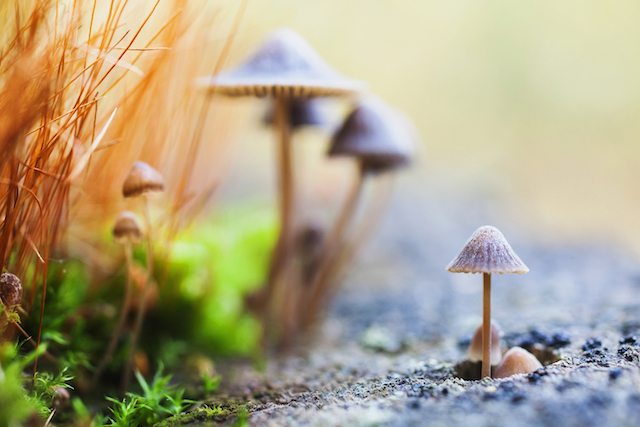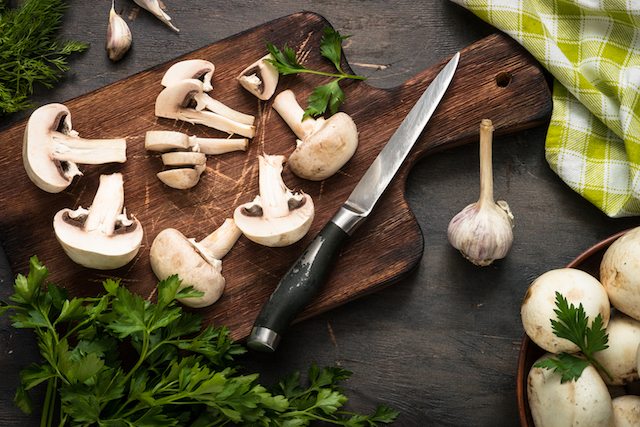Let’s be real, Beauties- we all care how we look and how we feel. And why wouldn’t we?? We all deserve to be our best, each and every day. We have this incredible potential to create and intelligence to repair and rejuvenate, that is, so long as we have the right materials…
One of the most important materials for our health and beauty is the right vitamins. Vitamins play a significant role in our energy levels, physical appearance (hair, skin nails, etc.), vitality, moods and many other areas.
Have you ever wondered about the function of specific vitamins — like B12? More importantly, are you certain that you’re getting enough of it? The issue of whether or not you’re getting enough B12 has been brought up as a concern of plant-based diets.
The fact of the matter is, the concern is one that applies to people of all kinds of diets — in other words, meat-eaters are not exempt from a deficiency. So, why do you need vitamin B12? And what are the best plant-based sources?
Read on for the low-down on all your burning questions.
What does vitamin B12 do?
B12 is quite the little multi-tasker. It plays a role in the function of your brain (and entire nervous system), and red blood cell formation (thus helping to prevent anemia). When you ingest anything with vitamin B12, hydrochloric acid in the stomach separates it from any protein it was attached to, and the vitamin then combines with a protein made specifically by the stomach, at which point it can then be absorbed by the body.
Vitamin B12 also acts to eliminate homocysteine — which is known to boost your odds of heart disease — from the body. And since B12 is critically involved in the absorption of folic acid (vitamin B9), it aids in the production, repair, and preservation of your DNA and RNA.
Calling all soon-to-be or new mamas: healthy levels of vitamin B12 can reduce the risks of severe birth defects when you’re pregnant or nursing [1].
Why else do I need it?
Research is mounting on the power of vitamin B12, and its capabilities have been shown to potentially extend beyond the list above…
How much vitamin B12 do I need?
Guess what? The good news is that vitamin B12 is such a powerful little vitamin, you don’t need much of it to reap the benefits.
The amount of vitamin B12 you need in your diet depends on your age, as well as other factors. However, the National Institutes of Health advises that on a daily basis adults get at least 2.4 micrograms, pregnant women get 2.6 micrograms and breastfeeding women get 2.8 micrograms. You can always check with your doctor if you’re not certain about your needs [2].
Who’s at risk of a deficiency?
Let’s get one thing straight: vegans and vegetarians are not the only ones who need to worry about getting enough vitamin B12.
First of all, your body’s ability to absorb this vitamin slows down as you get older. That’s why essentially everyone over 50 is advised to take a vitamin B12 supplement. However, this is not an issue that only affects the elderly. In fact, findings from the Framingham Offspring Study suggested that insufficient absorption of B12 may be common among adults between the ages of 26 to 49 [3, 4].
Moreover, certain medications (like certain heartburn and anti-diabetic drugs, as well as antibiotics) can boost your risk of a deficiency.
People with pernicious anemia are unable to make the protein in the stomach that binds with B12 (called intrinsic factor) have trouble absorbing the vitamin. And they aren’t the only ones: Non-anemic people are still at risk of their stomach lining not producing enough intrinsic factor [5].
Which brings me to another point: malabsorption is one of the biggest problems that lead to a deficiency. In other words, just because you think you’re ingesting a lot of the vitamin (looking at you meat-eaters, too) doesn’t mean you’re actually absorbing enough of it and thus getting all of its benefits.
The absorption of vitamin B12 is a complicated subject. If your body has low levels of hydrochloric acid, for example, B12 may not be fully released from your food. And many people are entirely unaware that they don’t produce sufficient amounts of stomach acid to absorb B12. People with stomach and small intestine disorders (such as Crohn’s and Celiac Disease) as well as people who use proton-pump inhibitors for acid reflux disease, may also be at risk of a deficiency.
How do I know if I’m deficient?
A blood test may seem like the most obvious method for figuring out whether you have a deficiency. However, there are factors that can lead to a false reading, which is why tests for homocysteine levels and methylmalonic acid are some of the most accurate ways to determine if you have a deficiency, as these substances will spike when you don’t have enough of the vitamin in your body.
Still, there are warning signs you can also keep an eye out for. David G. Schardt, the senior nutritionist for the Center for Science in the Public Interest, revealed in an online posting that fatigue, tingling and numbness in the hands and feet, muscle weakness, a sore/red tongue, loss of reflexes, depression and memory loss (and in extreme cases, dementia) are all symptoms of a vitamin B12 deficiency [6, 7].
Dizziness, blurred vision, shortness of breath after walking short distances, and unusually pale skin or white spots on the skin are other signs of a possible deficiency as well. Researchers are still trying to determine why B12 may play such a notable role in how you feel mentally and emotionally, but it’s likely because the vitamin helps with the synthesis of dopamine and serotonin, brain chemicals that are involved in mood regulation.
A “pins and needles” sensation (or any other strange sensation) may be pointing to a B12 deficiency. Vitamin B12 ensures that there’s enough oxygen in the cell — when those levels are low, the result can be nerve damage (which is responsible for those bizarre feelings).
Fatigue is one of the primary indicators of a deficiency. That’s because B12 is crucial in the production of red blood cells — and those very cells carry oxygen to the rest of your body so that organs can function properly. Additionally, B12 plays a crucial part in the production of melatonin (the “sleep hormone”).
Does a load of groceries suddenly feel much heavier? Your muscles need sufficient oxygen from red blood cells to work effectively, so weakness is another primary sign of a potential vitamin B12 deficiency.
The scary part is that these symptoms can take several months to a year to gradually develop, meaning you may not recognize a B12 deficiency right away.
How do I get more of it?
The harsh reality is that the human body does not naturally produce vitamin B12, so you need to make sure to incorporate enough of it into your diet. But fret not: There’s no reason why you have to give up your plant-based diet just to up your vitamin B12 intake.
For one, while nutritional yeasts don’t naturally contain B12, certain brands are fortified with the vitamin. It’s worth noting that vitamin B12 is sensitive to light, so don’t store this product in a clear container (and ideally put it in a dark place, like the refrigerator), or its potency could be seriously impacted.
Did you know that mushrooms boast more B vitamins than other vegetables? That’s right, those little fungi come from an entirely different food kingdom, so they feature a different nutritional profile from say, kale and carrots and peppers (though those all have their own benefits, of course). Specifically, mushrooms are an excellent source of B12.
In fact, a 2009 study at the University of Western Sydney found that B12 is present on both the surface of the mushroom cup as well as in the flesh of the mushroom. Moreover, the vitamin is available in the exact same form as it is in meat and easily absorbed by the body [8].
In recent years, there has been an increasing body of research on the vitamin B12 content in algae — specifically, chlorella and nori. One study published in the Journal of Medicinal Food, which was aimed at determining whether adding 9 g of Chlorella pyrenoidosa daily could help reduce a vitamin B12 deficiency in vegetarians and vegans, revealed that chlorella is indeed an excellent bioavailable source of the vitamin for vegetarians and vegans. Some studies have also shown that nori contains significant quantities of vitamin B12, and others have found that it also has a clearly positive biological impact when tested on rats [9, 10, 11].
Yet the BEST way to ensure you’re consistently getting enough vitamin B12 is to take a supplement. Look for a vegan, non-synthetic product that features the whole spectrum of B vitamins if possible (as opposed to just an isolated B12 vitamin — although that’s better than nothing at all).
Note that consuming more than 500 mg of vitamin C at the same time can destroy B12, so be careful with what vitamins you’re taking and when. Speaking of supplementing your diet, use of a high-quality soil-based probiotic, which helps to balance your gut microbiome, can ensure that your intestines are able to absorb and use vitamin B12 (as well as other vitamins) more easily. By aiding in digestion, these probiotics allow your gut to actually produce and synthesize missing components of the B vitamin complex.
The symptoms of a B12 deficiency simply aren’t worth the risk. And since it would be difficult to get an adequate amount from foods alone — I always recommend incorporating a supplement. After all, it’s better to be safe than sorry when it comes to your health, beauties!
In love and health,
Kimberly
[2] Vitamin B12
[3] Vitamin B12 Dietary Supplement Fact Sheet
[4] Plasma vitamin B-12 concentrations relate to intake source in the Framingham Offspring Study
[5] Vitamin B12 Fact Sheet for Consumers
[6] Memory Loss
[7] Did a vitamin B-12 deficiency drive Mary Todd Lincoln mad?
[8] Vitamin B12 is the active corrinoid produced in cultivated white button mushrooms (Agaricus bisporus).
[9] Nutritional Supplementation with Chlorella pyrenoidosa Lowers Serum Methylmalonic Acid in Vegans and Vegetarians with a Suspected Vitamin B₁₂ Deficiency
[10] Dried green and purple lavers (Nori) contain substantial amounts of biologically active vitamin B(12) but less of dietary iodine relative to other edible seaweeds.
[11] Feeding dried purple laver (nori) to vitamin B12-deficient rats significantly improves vitamin B12 status.

Bubby and I exploring Ishigaki Island in Japan. We sure ate a lot of mushrooms over there! xx





Great post, Kimberly! So informative and easy to understand. :) What B12 supplement do you take?? I am researching different ones, and want to make sure I am on the right track. Also, for kids?
Thank you!!
Hi Alisha – thanks so much for checking out my post. I like suggesting a whole-food based, non-synthetic brand that you find locally since there are so many brands out there. Garden of Life is one option that is typically in health food stores. Also, asking your health care practitioner is my best suggestion for you as well as for your kids. This will ensure you are receiving what is best for you personally. Sending you so much love and hope to see you back here soon! ;)